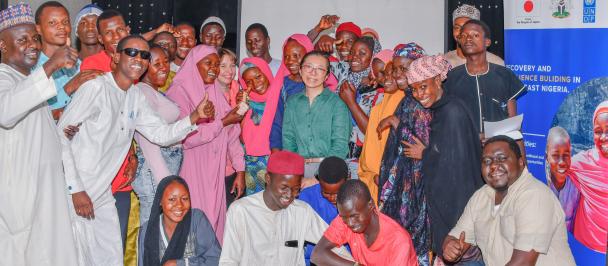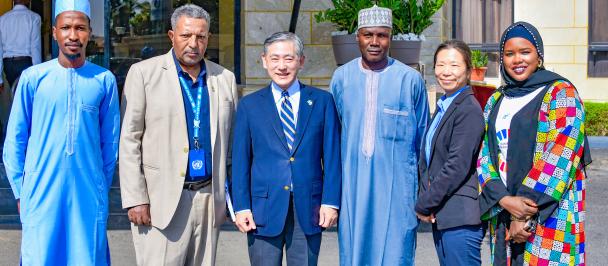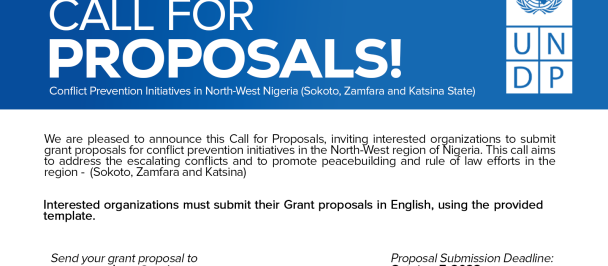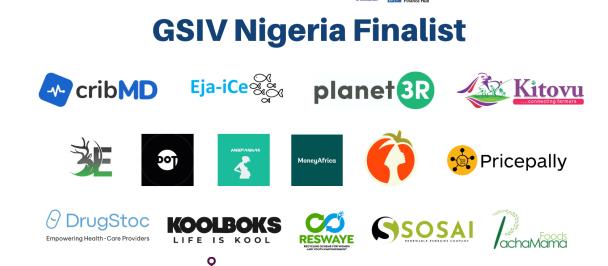Theme –“ Breaking the Gridlock: Reimagining Cooperation in a Polarized World”
Speech by Ms. Elsie Attafuah Resident Representative, UNDP Nigeria at launch of the 2023/2024 Human Development Report in Nigeria
March 19, 2024

Honorable Minister of Finance and the Coordinating Minister of the Economy, Wale Edun
Honourable Minister of State for Labour and Employment, Nkiruka Onyejeocha
Honourable Minister of Youth Development, Dr Jamila Bio Ibrahim
His Excellency, Mohammed Fall, Humanitarian and Resident Coordinator for the United Nations in Nigeria
Excellencies, Ambassadors and Heads of Internation Organizations & UN agencies
Representatives of Ministries, Departments and Agencies
Representatives from the Academia and Think Thanks
Development Partners
UN Colleagues
Representatives from the Private Sector, Civil Society and Media
Distinguished participants, ladies and gentlemen.
On behalf of the United Nations Development Programme (UNDP) and the entire United Nations family in Nigeria, I am delighted to welcome you all to this national launch of UNDP’s 2023-2024 Human Development Report (HDR) under the theme “Breaking the Gridlock: Reimagining Cooperation in a Polarized World”.
Let me begin by expressing my sincere thanks and appreciation to our special guest of honor, Hon. Wale Edun the Honourable Minister of Finance and the Coordinating Minister of the Economy –for joining us today, as well as Senior Government Officials and development partners for honouring us with your presence and accepting our invitation.
Hon. Ministers, Your excellencies
UNDP began this conversation on 13th March 2024 in New York City at the global launch, where a number of high-level speakers, including UN Secretary-General António Guterres; President of Singapore, Former President of Costa Rica, and UNDP Administrator, Achim Steiner among others who all highlighted the relevance of this report in the current global context.
It is a delight for us to continue this important conversation today in Naija and our Federal Capital Territory with the beautiful undulating hills and sunshine.
The 2023-2024 Human Development Report (HDR) reflects on how we are all interconnected at national, continental and global levels by our economic and digital interdependence, for example. Despite these connections, we seem to be separated and not working in unison to solve our shared development challenges.
What does this mean to break the gridlock and how can we work together?
Allow me to start off a quote from a doctor on how young people feel about our world today, “Tell me how to stay alive and sane in a world that clearly just does not care about us having a future”. This question reflects how many young people feel about today’s world. A world in which the gap between the rich and the poor are widening, posing a threat to human development. A world in which we see increasing polarization that pulls us apart and stops us from working together. A world in which the Sustainable Development Goals (SDGs) are off track to meet the targets we set for 2030.
So with this background, the release of the HDR serves as a catalyst for change. It emphasizes that we live in a world tightly knitted by interdependence. The world is increasingly connected as planetary changes deepen and digital revolution spreads. This interdependence has meant shared challenges such as climate change, global pandemics, biodiversity loss, and digital misinformation. But also opportunities we can leverage.
Hon. Ministers, Your Excellencies,
Now let me take you down the HDR memory lane:
As many of you know, human development is about is human freedoms. It is about building human capabilities. In 1990, UNDP published the first HDR with an introduction of a new Human Development Index (HDI) to measure development progress. The underlying principle of the HDI, considered radical in 1990, was very simple: national development should be measured not simply by per capita income, as had long been the practice, but also by health, education, living standards and other important indicators.
For the last 34 years, UNDP has released the HDR and HDI annually, ranking all countries by health, education and living standards. In the last 3 decades, UNDP has produced more than 800 global, regional, national and sub-national reports, and organized hundreds of workshops, conferences and other outreach initiatives to foster human development.
These activities have extended the frontiers of analytical thinking about human progress beyond economic growth, firmly placing people and human well-being at the centre of development policies and strategies.
Since its inception, the HDR has become a flagship knowledge product. This unique annual report has not only helped to establish a new broad definition of development, but also to evaluate the progress made and highlight key challenges drawing on statistics. This report encourages political leaders, decision-makers and development practitioners around the world to keep raising our ambitions and actions needed.
Hon. Ministers, Excellencies
Allow me now to turn to the key findings and recomendations of the 2023-24 HDR.
Based on the 1999–2019 trend, the global HDI value was on track to cross the threshold that defines very high human development (a value of 0.800) by 2030—coinciding with the deadline to meet the SDGs. Now, the world is off track.
The 2023/2024 HDR shows that the path of human development progress which shifted downwards in 2020 have remained below the pre-2019 trend, threatening to entrench permanent losses in human development gains.
Deaths from violent conflict and displacement are increasing – reaching the highest levels since World War II.
Temperatures are rising – with 2023 being the hottest temperature ever recorded.
Inequalities are widening between countries at the bottom and countries at the top of the HDI.
Feelings of stress, insecurity, sadness, and anxiety are also rising, reaching its highest levels since the Gallup surveys began. New analysis in the HDR using data from the World Values Survey shows that only half of the global population feels in control of their lives and that only one-third of people believe that their voice is heard in their political system.
The HDR argues that polarization and mismanagement of cross-border interdependencies are at the root of many contemporary challenges, ranging from debt distress in numerous low- and middle-income countries to threats to food security to a pervasive sense of disempowerment around the world.
For Nigeria, while HDI value has moved upward by 22% between 2003 and 2022, her human development remains low at 0.548 – placing the country in a low human development category.
Hon. Minsiters, Excellencies, distinguished guests,
The Report calls us to change course, otherwise the world may not recover from the decline in human progress. The repercussion of not changing course and removing the gridlock is in the additional lives that will be lost, in opportunities that will be forgone, and in feelings of despair.
So how do we change course? The report argues that we need to capitalize on our local and global connections, choosing cooperation over conflict. The Report is an invitation to reimagine cooperation by pursuing three ideas that it encourages the world to fight for. These include taking steps to:
Lower tensions and push back on the divide hindering cooperation. To do that, we must intentionally create spaces of deliberation to bridge divides.
Addressing agency gap in policies and norms to empower individuals in pursuing their legitimate and innate aspirations.
Constructing a 21st century architecture for international cooperation to deliver global public goods—from climate change mitigation to pandemic preparedness to biodiversity preservation as well as the digital public infrastructure– that would be harnessed for people to flourish in more equitable ways.
Hon. Ministers, Excellencies, distinguished Ladies and Gentlemen,
The Human Development Report has provided analysis to show that the solutions to our problems are within our grasp. By reimagining cooperation and uniting for a better world we can address shared challenges and make progress towards achieving sustainable development. As an example, the Government of Nigeria is already leading the way by bridging the humanitarian-development-peace nexus in practicable ways. Under the leadership of the Governor of Borno State, His Excellency Professor Zulum, Borno State is developing an Action Plan for Durable Solutions to achieve lasting solutions for over 2.5 million Internally Displaced Persons. The action plan helps to bridge the humanitarian and development nexus, and perhaps the ideological divide that sometimes separates development and humanitarian actors. Prof Zulum, during our recent visit to Maidiguri, asked us to look into the eyes of the young people in the IDP camps. And I looked into their eyes and saw the hope and aspirations of these young people. A call for all of us to reimagine co-operation in support of the Nigeria we Want.
Against this backdrop, UNDP’s support through its throught leadership work, such as the HDR, is designed to help decision-makers and all of us change course and accelerate progress, towards 2030, lowering tensions, addressing agency gap and building a 21stcentury financial architecture to deliver essential public goods. Our work on energy, gender, trade, climate, poverty eradictation, governance, peace and security and many more are our bold attempts to look into the eyes of the young people that Prof. Zulum mentioned. We owe it to ourselves, to each other, our children and their children to break the gridlock and to reimagine co-operation in a polarized.
On behalf of UNDP –as a member of the wider UN system – we remain steadfast in our pledge of continued support to Nigeria’s development journey.
I am now eager to listen to our discussion on the challenges and opportunities that lie ahead, armed with the findings, facts and statistics in this year's Human Development Report and how we responsd to the youth who said, “Tell me how to stay alive and sane in a world that clearly just does not care about us having a future”.
I thank you.

 Locations
Locations



